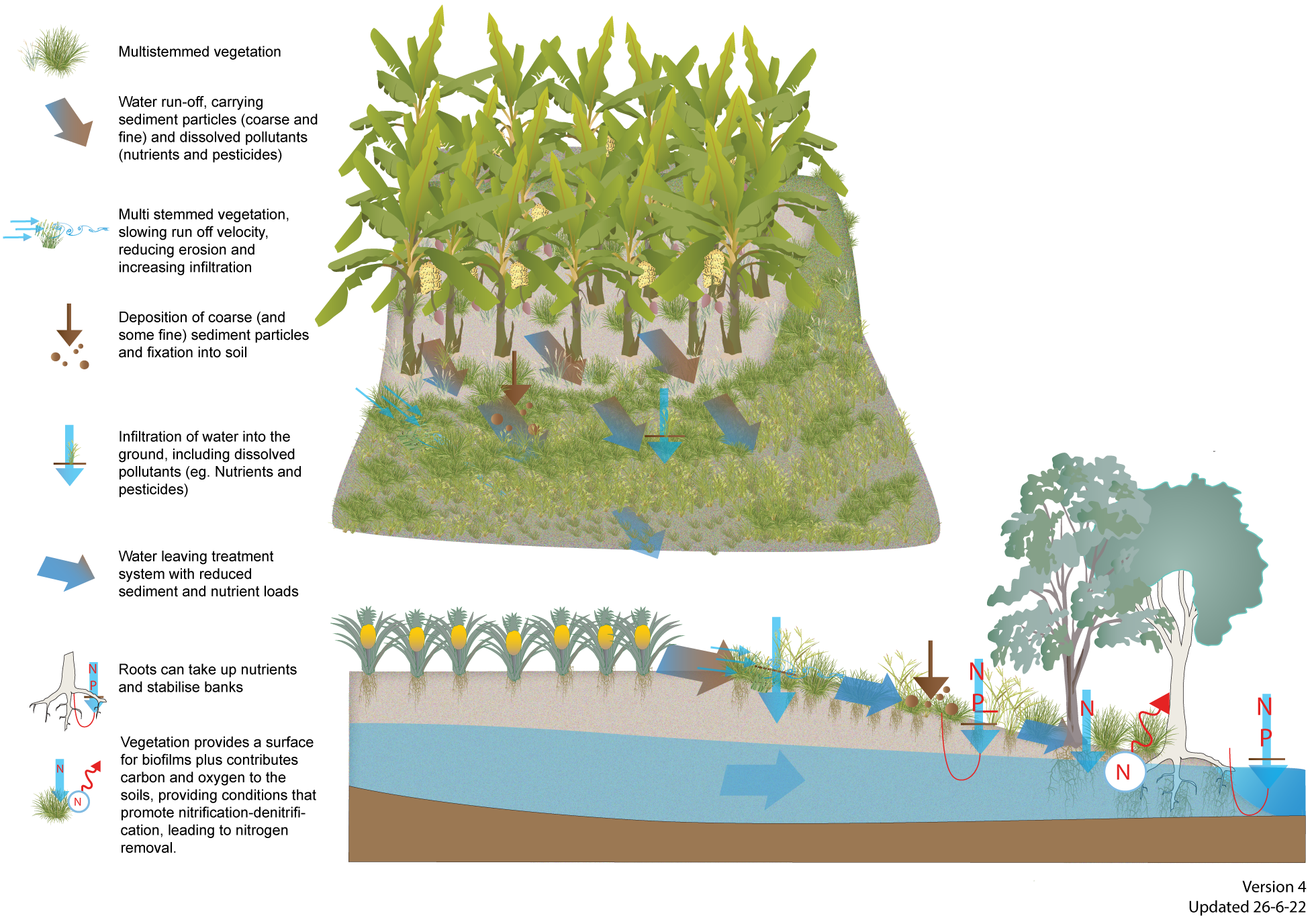|
|
Vegetated buffers and swalesVegetated buffers and swales — Links and referencesSelect from the tabs below Useful Links Soil conservation guidelines for Queensland Riparian Land Management Technical Guidelines Volume 2 On-Ground Management Tools and Techniques Preventing and managing erosion, including links to soil conservation waterways factsheets Edge of block factsheets for extension officers Designing filter strips to trap sediment and attached nutrients Queensland Wetland Buffer Planning guideline Wetland buffer case study: Lake Broadwater References Brodie, J., Waterhouse, J., Lewis, S., Basnett, A., Davis, A., Alexander, F. and Ginders, M., (2011) Comparative effectiveness of community drainage schemes and EVTAs in trapping PSII herbicides from sugar cane farms. Australian Centre for Tropical Freshwater Research: Townsville, Queensland, Australia. p. 68. Carey, B.W., Stone, B., Norman, P.L. and Shilton, P. (2015) Soil conservation guidelines for Queensland, Department of Science, Information Technology and Innovation, Brisbane. https://publications.qld.gov.au/dataset/soil-conservation-guidelines DeBose, J., Coppo, C., McIntyre, R., Nelson, P., Karim, F., Davis, A. and Brodie, J. (2014) Effectiveness of vegetated systems in managing contaminated runoff from sugarcane and banana farms to protect off-farm aquatic ecosystems, particularly the Great Barrier Reef. TropWATER Report No. 14/10, Centre for Tropical Water & Aquatic Ecosystem Research (TropWATER), James Cook University, Townsville, 118pp. Department of Employment, Economic Development and Innovation (2011) Wetland Management Handbook: Farm Management Systems (FMS) guidelines for managing wetlands in intensive agriculture. Queensland Wetlands Program, Brisbane https://wetlandinfo.des.qld.gov.au/resources/static/pdf/resources/reports/fms/fms_025_handbook_web.pdf Dosskey, M.G. (2001) Toward quantifying water pollution abatement in response to installing buffers on crop land. Environmental Management, 28(5): p. 577-98. DPI Victoria (2002) Using vegetation as a barrier to reduce spray drift, Agricultural Note 0860. Department of Primary Industries, Melbourne, Victoria. Karssies, K. and Prosser, I. (1999) Guidelines for riparian filter strips for Queensland Irrigators, Report 32/99, CSIRO Land and Water, Canberra. Krutz, L.J., Senseman, S.A., Zablotowicz, R.M. and Matocha, M.A. (2005) Reducing herbicide runoff from agricultural fields with vegetative filter strips: a review.Weed Science 53: p. 353-67 Liu, X., Zhang, Z. and Zhang, M. (2008) Major factors influencing the efficacy of vegetated buffers on sediment trapping: A review and analysis. J. Environ. Qual. 37:1667-1674. McKergow, L.A., Prosser, I.P., Grayson, R.B. and Heiner, D. (2004) Performance of grass and rainforest riparian buffers in the wet tropics, Far North Queensland. 2. Water quality. Australian Journal of Soil Research 42(4): p. 485-98. McKergow, L.A., Prosser, I.P., Grayson, R.B. and Heiner, D., (2004) Performance of grass and rainforest riparian buffers in the wet tropics, Far North Queensland. 1. Riparian hydrology. Australian Journal of Soil Research 42(4): p. 473-84 Norris, V. (1993) The use of buffer zones to protect water quality: a review.Water Resources Management 7(4): p. 257-72. Prosser, I. and Karssies, L. (2001) Designing filter strips to trap sediment and attached nutrients, River and Riparian Land Management Technical Guideline No. 1, Land and Water Australia, Canberra. Rassam, D., Pagendam, D. and Hunter, H. (2005) The Riparian Nitrogen Model (RNM): basic theory and conceptualisation (Technical Report). Cooperative Research Centre for Catchment Hydrology, Brisbane. Reichenberger, S., Bach, M., Skitschak, A. and Frede, H. (2007) Mitigation strategies to reduce pesticide inputs into ground- and surface water and their effectiveness; a review. Science of the Total Environment 384: 1-35. Sugar Research Australia (2013) Rat management in sugarcane, Booklet B14023, Sugar Research Australia, Brisbane. USDA (2000) Conservation buffers to reduce pesticide losses. USDA Natural Resources Conservation Service. https://www.nrcs.usda.gov/Internet/FSE_DOCUMENTS/nrcs144p2_030970.pdf Zhang, X., Liu, X., Dahlgren, R.A. and Eitzel, M. (2009) A review of vegetated buffers and a meta-analysis of their mitigation efficacy in reducing nonpoint source pollution. J. Environ. Qual. 39(1):76-84. Main illustration by Lana Baskerville using IAN symbols library.DisclaimerIn addition to the standard disclaimer located at the bottom of the page, please note the content presented is based on published knowledge of treatment systems. Many of the treatment systems described have not been trialled in different regions or land uses in Queensland. The information will be updated as new trials are conducted and monitored. If you have any additional information on treatment systems or suggestions for additional technologies please contact us using the feedback link at the bottom of this page. Last updated: 5 November 2022 This page should be cited as: Department of Environment, Science and Innovation, Queensland (2022) Vegetated buffers and swales — Links and references, WetlandInfo website, accessed 8 May 2025. Available at: https://wetlandinfo.des.qld.gov.au/wetlands/management/treatment-systems/for-agriculture/treatment-sys-nav-page/vegetated-buffers/links-and-references.html |

 — Department of the Environment, Tourism, Science and Innovation
— Department of the Environment, Tourism, Science and Innovation



